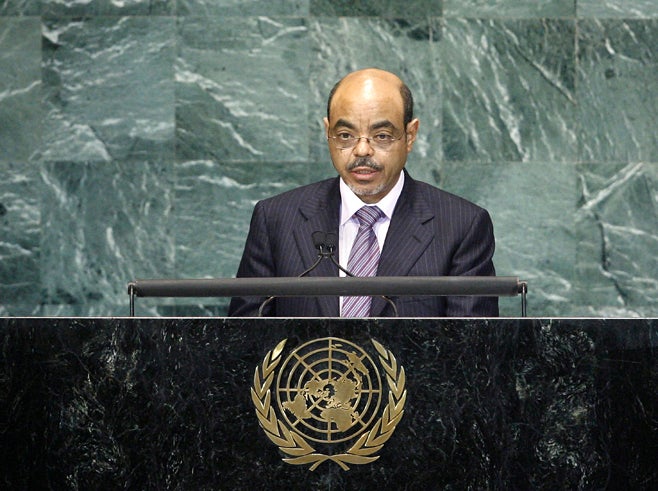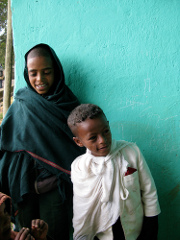 |
Ethiopian Prime Minister Meles Zenawi. © 2010 UN Photo |
The Ethiopian government should cease using its overly broad anti-terrorism law against journalists and peaceful political activists, two major human rights groups say.
Human Rights Watch and Amnesty International issued a comment on the worsening situation on Monday 21 November 2011 - two days before the trial of 24 people charged on 10 November with terrorism offences continues.
Those charged include six journalists and two members of the opposition Unity for Democracy and Justice (UDJ) party.
Sixteen of the 24 are being tried in absentia. Several other terrorism trials of journalists and opposition activists are ongoing.
“The Ethiopian government is exploiting its vaguely worded anti-terror law to crush peaceful dissent,” said Rona Peligal, deputy Africa director at Human Rights Watch.
The Anti-Terrorism Proclamation of 2009 includes an overbroad and vague definition of terrorist acts and a definition of “encouragement of terrorism” that makes the publication of statements “likely to be understood as encouraging terrorist acts” punishable by 10 to 20 years in prison.
These provisions mean that critics of government such as journalists and political opponents could be charged for encouraging terrorism, Human Rights Watch and Amnesty International said.
The organisations urged the Ethiopian government to facilitate systematic monitoring of the trials by the diplomatic community. The times and locations of hearings have been altered at the last minute at least twice during the ongoing trials. The government should ensure that key information, including location and time of hearings, is available to the public.
Amnesty International and Human Rights Watch also urged diplomats stationed in Ethiopia to carry out systematic monitoring of the ongoing terrorism trials and the trials of members of the Oromo political opposition arrested during 2011.
This is particularly important in the absence of independent human rights organisations, which the Ethiopian government has effectively banned. While diplomatic representatives have attended several remand hearings and trial sessions of terrorism cases, none were apparently present at the November 10 confirmation of charges hearing, following a last-minute change of location, nor at the subsequent hearing on 15 November.
Ethiopia’s foreign partners closely followed a series of trials from 2005 to 2007, in which treason charges were brought following contested elections. The Council of the European Union appointed a full-time trial observer, although the findings of its report were never made public. EU embassy staff monitored these trials on a rotating basis, and a US embassy staff member was also present.
“Diplomats’ systematic monitoring of these trials is essential,” said Michelle Kagari, deputy director for Africa at Amnesty International. “Without the presence of local civil society, diplomats can play a vital role in witnessing whether or not the suspects’ right to a fair trial is respected.”
None of the defendants detained and charged under the Anti-Terrorism Proclamation during 2011 had access to a lawyer during the pre-trial period. Three of those charged have complained in court of mistreatment in detention.
Public comments by Prime Minister Meles Zenawi and the government spokesman, Shimeles Kemal, have undermined the defendants’ presumption of innocence, Human Rights Watch and Amnesty International said. Their comments might also exert political pressure on the courts in a country where the judiciary lacks independence.
Since June 2011, the Ethiopian government has charged at least 33 people under the Anti-Terrorism Proclamation of 2009.
In addition, in 2011, at least 98 members of the two main Oromo political opposition parties, the Oromo Federal Democratic Movement (OFDM) and the Oromo People’s Congress (OPC), have been arrested and charged under the Criminal Code on the basis of alleged involvement with the Oromo Liberation Front, a banned rebel group.
Seven of the people charged on November 10 had previously been charged during the trials that followed the 2005 elections. All had been given a presidential pardon. Three of the seven are among the defendants who are now in custody, two others fled the country after their earlier release, and two were already living in exile when they were charged in the earlier cases.
Human Rights Watch and Amnesty International have long called for the anti-terrorism law to be amended to bring it into line with Ethiopia’s domestic and international legal obligations.
“The anti-terror law itself is a huge problem,” Peligal said. “The international community, especially the European Union, United States, and United Kingdom, should ask the Ethiopian government hard questions about why it is using this law to crack down on peaceful independent voices.”
[Ekk/3]


